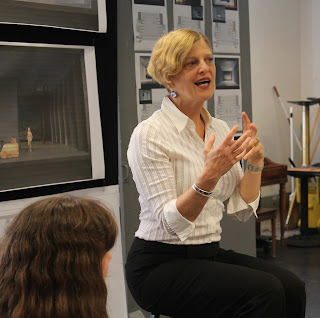Love: Tom Stoppard's Preoccupation
By Elspeth Sweatman
"It's a fascinating thing to have a long, ongoing relationship with a writer," said A.C.T.'s Artistic Director Carey Perloff at the first rehearsal for Tom Stoppard's The Hard Problem. "What you realize is that everybody has their own life preoccupations, and they make art in order to try and wrestle with them."
The Hard Problem is the eleventh Stoppard play Perloff has directed at A.C.T., giving her a unique perspective on this playwright's work. In her view, one of Stoppard's preoccupations is the nature of love. "In Arcadia, he toys with the way in which love is an anarchic emotion that spreads chaos amongst seemingly reasonable people. People don't always act in their own reasonable interests because love enters the universe, and then all hell breaks loose."
"In this play, The Hard Problem, love is particularly focused on mother love. The question of what mother love is, and why that's so profound and why the protagonist, Hilary, can't get over it. Another character, Spike, says that mother love is just 'mother maximizing gene potential.' And he is unbelievably embarrassed at the thought that there is actually a real thing—maternal love—that trumps neuro-scientific analysis."
In The Hard Problem, Stoppard even extends his preoccupation with love to the financial markets and the 2008 crash. "Woven into this question about consciousness is a question about the financial markets and why all these brilliant psychometric, algorithm-driving quants were unable to figure out the market was going crazy. He finally says, 'It's like falling in love.' It's like the market has fallen in love, and the market that behaved predictably has now gone haywire."
"I think Tom's a little bit of an anarchist at heart, and he's really interested in chaos, and chaos comes from internal emotional chaos, that comes from love and desire and sexuality."
The Hard Problem begins October 19 and runs through November 13. Click here to purchase tickets.
 |
| A.C.T. Artistic Director Carey Perloff at the first rehearsal for The Hard Problem. Photo by Shannon Stockwell. |
The Hard Problem is the eleventh Stoppard play Perloff has directed at A.C.T., giving her a unique perspective on this playwright's work. In her view, one of Stoppard's preoccupations is the nature of love. "In Arcadia, he toys with the way in which love is an anarchic emotion that spreads chaos amongst seemingly reasonable people. People don't always act in their own reasonable interests because love enters the universe, and then all hell breaks loose."
In The Hard Problem, Stoppard even extends his preoccupation with love to the financial markets and the 2008 crash. "Woven into this question about consciousness is a question about the financial markets and why all these brilliant psychometric, algorithm-driving quants were unable to figure out the market was going crazy. He finally says, 'It's like falling in love.' It's like the market has fallen in love, and the market that behaved predictably has now gone haywire."
"I think Tom's a little bit of an anarchist at heart, and he's really interested in chaos, and chaos comes from internal emotional chaos, that comes from love and desire and sexuality."
The Hard Problem begins October 19 and runs through November 13. Click here to purchase tickets.

